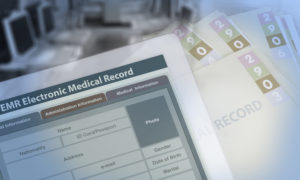By Jim Grue, OD,
Ronald P. Snyder, OD, FAAO,
and Michael J. Lipson, OD, FAAO, FSLS

May 3, 2023
The early phases of healthcare reform started with the passage of the Affordable Care Act, which was driven by Meaningful Use and Merit-based Incentive Payment System (MIPS) measures. At that time, provider participation was completely voluntary with few consequences for non-participation.
With the passage of the 21st Century Cures Act, designed to stop information blocking, that has changed. This new law affects every provider, regardless of whether or not they are participating in MIPS, and specifically states that faxes do not meet the requirements of the information-blocking rules.
Currently, 25 percent of a MIPS score is based on a measure of the percentage of referrals sent or received by an office that are accompanied by a report that includes structured fields. That requires providers to coordinate the care of the patient by electronically sharing the patients’ health information instead of through fax.
Improving Your MIPS Score
To underscore the importance of the new MIPS measures, the scale below shows how the MIPS score is created. This article is focusing only on the second step, promoting interoperability. If a provider scores poorly on this section, they are likely to be penalized even if they score well on the other sections.

The implications for eyecare are significant. Each provider needs to assess their own MIPS score in addition to the effect they have on other healthcare providers in their community.
Any optometric office that routinely shares patients with ophthalmology and primary care physicians’ practices impacts their MIPS. Anytime you send a fax to either a physician or an ophthalmologist, you are likely reducing their MIPS score. Penalties for poor performance on MIPS in 2023 can be as high as 9 percent.
Increase Your Reciprocal Referrals from Other Doctors
It should now be apparent that those providers who report MIPS scores will increasingly steer patients to eyecare providers who help raise their score and away from those who don’t. Primary care physicians (PCPs) will likely be more aggressive in directing their diabetic patients to eyecare providers that they know will send electronic reports instead of faxes.

To learn more: 844.393.3282. (toll free) or ContactUs@HealthCareRegistries.com
Your favorite ophthalmologist will likely continue to accept your referrals, however, every time you refer a patient without an electronic report, send a fax or do not send an electronic post-opt report for co-managed cataract surgery, you will be lowering that ophthalmologist’s MIPS score.
You probably have a good rapport with your local ophthalmologists, however, if you continue to fax reports to their office, you will be contributing to the possibility that they will be penalized by 9 percent for providing care to your patients.
The solution isn’t complicated. Every “certified” EHR supports Direct Secure Messaging. All you have to do is make sure that your EHR vendor turns on Direct Messaging, which is already included in your “certified” EHR. Your reports will then be automated and sent securely to other providers in a way that meets the MIPS requirements.
Other Articles to Explore
Direct Messaging will enable you to send and receive patient health information electronically, which will significantly improve your practice efficiency, and may even allow you to see more patients per day with less effort. In addition, other services you may not be familiar with, such as Kno2 and Carequality, make it easier to get accurate patient health information with less effort.
By simply transitioning from faxing to Direct Secure Messaging, like the rest of medicine, you will become the preferred practice for co-management and referral with your local PCPs and ophthalmology practices.
 James E. Grue, OD, is a health-care reform speaker and consultant. To contact him: JimGrue@HealthCareRegistries.com
James E. Grue, OD, is a health-care reform speaker and consultant. To contact him: JimGrue@HealthCareRegistries.com
 Ronald P. Snyder, OD, FAAO, is the president and CEO of HealthCare Registries, LLC. To contact him: RonSnyder@HealthCareRegistries.com
Ronald P. Snyder, OD, FAAO, is the president and CEO of HealthCare Registries, LLC. To contact him: RonSnyder@HealthCareRegistries.com
 Michael J. Lipson, OD, FAAO, is the chairman of the OrthoK Advisory Panel of HealthCare Registries, LLC.
Michael J. Lipson, OD, FAAO, is the chairman of the OrthoK Advisory Panel of HealthCare Registries, LLC.



























